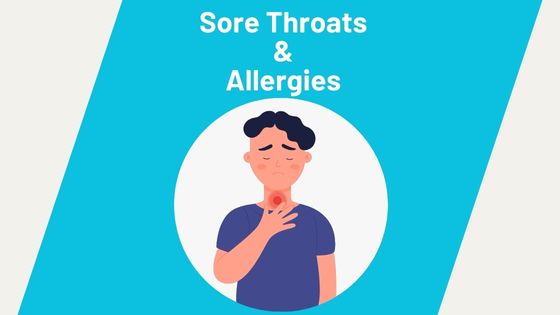Can Allergies Cause a Sore Throat?

When you experience a sore throat, you may immediately think of a cold or the flu as the culprits. However, allergies—a less suspected cause—can also be behind this uncomfortable condition.
If you’re wondering whether your sore throat could be triggered by allergies, you’re not alone. Many patients face this issue, especially during peak allergy seasons. Here we’re going to explore the connections between allergies and sore throats, helping you identify the cause and find the right treatment for you.
What Causes a Sore Throat?
A sore throat serves as a signal that something is off in your body. While the common cause is a viral infection, such as those associated with the common cold or flu, other factors like bacterial infections, smoking, dry air, acid reflux, and environmental irritants such as tobacco smoke, dust, and chemicals can also lead to a sore throat.
Allergies are also notable contributors as well. Exposure to allergens such as pollen, dust mites, pet dander, mold, and certain foods can cause inflammation in your throat, leading to the discomfort you feel.
Types of Sore Throat
Sore throats vary based on their underlying causes:
- Viral Sore Throats: These are the most common type and are frequently associated with colds or influenza. Symptoms might include a scratchy or swollen throat and may be accompanied by a runny nose, cough, fatigue, and mild fever. Viral sore throats typically resolve on their own within a week and do not require antibiotic treatment.
- Bacterial Sore Throats: Often caused by streptococcus bacteria, this type is known as strep throat. It is characterized by severe pain, red and swollen tonsils, sometimes with white patches or streaks of pus, and can be accompanied by a high fever and swollen lymph nodes in the neck. Unlike viral sore throats, strep throat requires treatment with antibiotics to prevent complications and speed up recovery.
- Allergic Sore Throats: These arise as part of the body’s immune response to allergens such as pollen, dust mites, pet dander, or mold. An allergic sore throat may feel persistently itchy or ticklish and is often accompanied by other allergy symptoms like sneezing, itchy eyes, and nasal congestion. These sore throats result from inflammation caused by the immune system’s reaction to the allergen, along with irritation from post-nasal drip where excess mucus irritates the throat.
Most people don’t think of allergies as causing their sore throat, but they indeed can. When you inhale or ingest allergens like pollen, dust, or mold, your immune system reacts by inflaming the tissues in your throat. This inflammation, coupled with post-nasal drip (mucus dripping down the back of your throat), irritates your throat further, creating soreness.
Distinguishing Allergy-Related Sore Throats from Infections
Distinguishing between a sore throat caused by allergies from one caused by an infection can be tricky. A sore throat from allergies typically accompanies other allergy symptoms such as sneezing, nasal congestion, and itchy eyes. Knowing your history of seasonal or environmental allergies can be a big clue.
On the other hand, infections may come with fever, swollen lymph nodes, white patches on the tonsils, and body aches. A medical evaluation, which might include a throat swab or allergy testing, is often necessary for an accurate diagnosis.
Duration and Factors Affecting Allergy-Related Sore Throats
The length of time a sore throat from allergies lasts can vary. It largely depends on the type and severity of the allergen exposure, your immune response, and whether you have underlying health conditions. Allergic sore throats can last from several days to weeks, especially if the allergen exposure continues without proper management.
Treatment Options
Addressing a sore, itchy throat caused by allergies involves:
- Avoiding known allergens.
- Using antihistamines to reduce allergic inflammation.
- Implementing nasal saline irrigation to clear nasal passages.
- Applying throat lozenges or sprays to alleviate throat discomfort.
- Considering long-term solutions like allergen immunotherapy for persistent cases.
Preventive Measures
Preventing an allergy-related sore throat centers on minimizing your exposure to allergens. Simple actions like keeping your living areas clean, using allergen-proof bedding, maintaining good indoor air quality with HEPA filters, and managing your exposure to outdoor allergens can make a significant difference. Staying hydrated and following an allergy treatment plan prescribed by an allergist are also key strategies.
For those struggling with allergies and the uncomfortable symptoms they bring, including sore throats, help is available. Allergy and Asthma Specialists of North Florida are here to assist you in managing your allergies effectively. Don’t let allergies hold you back—reach out to us today and breathe easier tomorrow.
